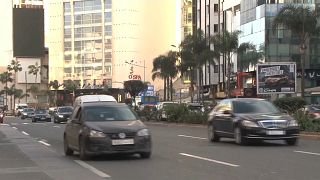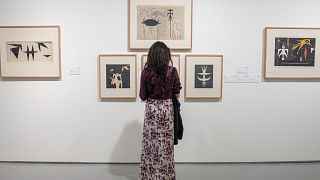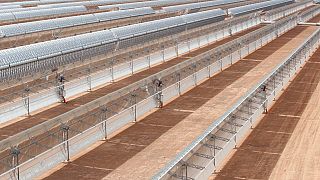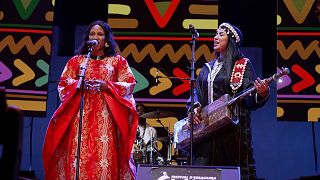Morocco
Halima Bousekkaoui is ready for tourists to stay at her guesthouse - but no one is coming.
Her Marrakesh business is one of many affected by the shutdown in travel caused by the pandemic.
Morocco welcomed 13 million tourists in 2019. In 2021, that dropped to just 4 million.
Late last year, the situation got much worse when Morocco suspended international flights to try to stop the spread of the omicron variant.
This guesthouse has room for 17 guests, but has been operating at just 20 percent capacity since the virus hit.
When flights were cancelled, even those customers were lost.
Bousekkaou used to employ six members of staff. Now there is just a manager and a housekeeper.
Morocco's air borders reopened on 7 February, but it will be a long road to recovery for this guesthouse.
"We have deteriorated a lot due to rising debts, we are no longer able to pay the salaries of employees, we are saving a lot to reduce the build up of debts, unfortunately debts rise every time," she says.
The tourism sector in Morocco was directly responsible for around 500,000 jobs and contributed $8 billion to the economy before the pandemic.
This is one of the biggest hotels in Morocco, with 1,800 beds.
In 2019, they had around 1,100 guests most nights. That dropped by 85 percent in 2019. Then the hotel closed.
Before, 600 people worked here.
Now Fatima Aliouate is one of 28 staff to still have a job. But she isn't sure how much longer that will last.
"I am afraid of losing my job, because there are no foreign clients. In this hotel there are no guests, so we are threatened with losing our work at any moment. Our business is related to foreigners, I spent my life working with foreigners, the hotel is our business and we have no knowledge of any other business," she says.
There are around 30,000 tourist businesses in Morocco, from guesthouses and restaurants to transport agencies.
There are 11,000 tourist vehicles in Morocco, 30 percent of them in Marrakech.
But with no visitors to ferry around these buses have been parked up for so long, weeds are growing around their tyres.
As people finally start to return to Morocco for their holidays, getting them back on the road is another problem.
"The losses are very large because stopping causes a number of damages. Today, the maintenance of these vehicles requires huge amounts of money to operate again," explains Mohammed Bamensour, general secretary of the National Federation of Touristic Transport in Marrakech.
Tourism receipts have plummeted compared to 2019, falling from 80 billion dirhams ( $8.6 billion) in 2019 to only 30 billion dirhams ($3.2 billion) in 2021.
Restaurants like this relied almost exclusively on foreign tourists.
Now, the tables are empty.
"The restaurant in Marrakech operates with 80 percent of guests being foreign guests, so the day after the borders closed, we lost 80 percent of our clients," says Imane Rmili, president of the Regional Association of Restaurants and owner of a restaurant in Marrakech.
Handicraft shops line Jamaa Lefna Square.
This used to be a popular spot for tourists to buy souvenirs to take home with them.
It was a place tourist guide Jamal Saadi would show his clients as he gave them a tour of his city.
For him, it's not just his bank balance that has suffered.
"As a tour guide, I experienced a financial crisis, but more than that, a major psychological crisis. We had no other job. We did not know how to do another job. We even had to sell everything we owned in order to be able to live," he explains.
At this conference centre, event organisers are discussing the future of their industry.
It will take a lot of time and effort to get big events up and running again.
"Knowing that big events and conferences are prepared at least 12 months in advance, we have a delay of 24 months which will be difficult to catch up on and we are obliged to be able to start our commercial steps from the opening of February 7th to hope to find a cruising rhythm for the year 2023," says Rita Touzani, general director of an events company in Marrakech.
There was a glimmer of hope back in summer 2021.
Between July and September, income from tourists hit almost 16 billion dirhams, compared to less than 5.4 billion for the first three months of the year.
But in November, the government brought in a flight ban which was extended again in December.
It was only on February 7 that flights were able to resume.
During the shutdown, the industry had to lobby hard for government support.
"Within two years, the tourism sector recorded an estimated decline of 80 percent and experienced a large loss in terms of income, amounting to about 20 billion dollars during this period. But the decisions to close that took place between October and November had a negative impact on the psychological side of professionals who believed that they had overcome the crisis. For these reasons, and after the insistence of professionals, the Moroccan government presented an emergency program to save the sector to restore its position," says Zoubir Bouhoute, researcher in tourism and counselor at the Regional Tourism Council in Marrakech.
The government dedicated an amount of two billion dirhams to support the tourism sector to confront this crisis.
But businesses need tourists to return if they are going to survive.











02:09
In a bid to aid its economy, Lebanon hopes to return to golden age of tourism
01:10
Ghana ends support to Western Sahara, backs Moroccan autonomy plan instead
Go to video
Ghanaian citizens can now travel to Morocco without a visa
01:07
China's visa-free policy for five Latin American countries takes effect
01:09
United Kingdom backs Morocco's autonomy plan for Western Sahara
Go to video
"Trap, Neuter, Vaccinate, and Return", Morocco’s strategy to save stray dogs